Dental Implants Lakewood
Permanent, Natural-Looking Tooth Replacement
Millions of Americans have to deal with missing teeth every day, causing them to limit their diet, choose their words carefully, and think twice before smiling. If this includes you, know that there is a definitive way to get your complete smile back: dental implants. These restorations look natural and can be trusted to replace any number of missing teeth for a lifetime, and now, they’re available at Lakewood Complete Dentistry. To learn more about dental implants in Lakewood and start rebuilding your smile, contact us today.
Why Choose Lakewood Complete Dentistry for Dental Implants?
- Entire Dental Procedure Performed All Under One Roof
- Dentists Can Replace Any Number of Missing Teeth
- Advanced Dental Procedures Available to Help You Become a Good Candidate
What Are Dental Implants?
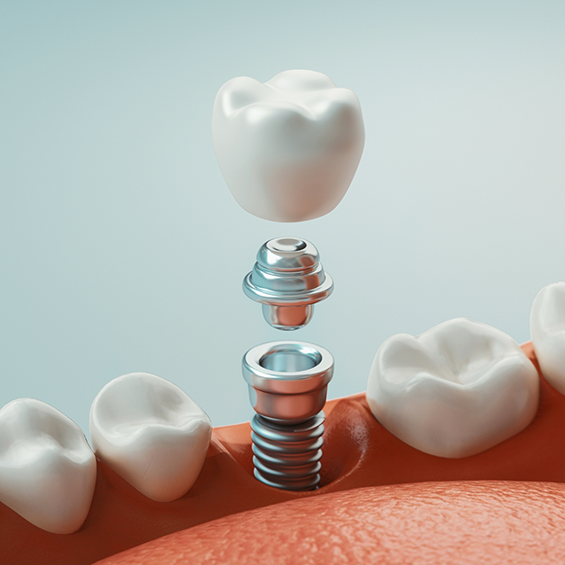
Unlike traditional tooth replacement options, dental implants are designed to replace missing teeth both above and below the gumline. A small implant post is placed in the jawbone to mimic tooth roots and provide a rock-solid foundation for the custom-made crown, bridge, or denture on top. Restoring the entire structure of your missing tooth not only provides unmatched comfort, stability, and functionality, but it also helps keep your jawbone healthy and preserves your youthful facial features. That’s why dentists widely regard dental implants as the new gold standard of tooth replacement.
The 4-Step Dental Implant Process
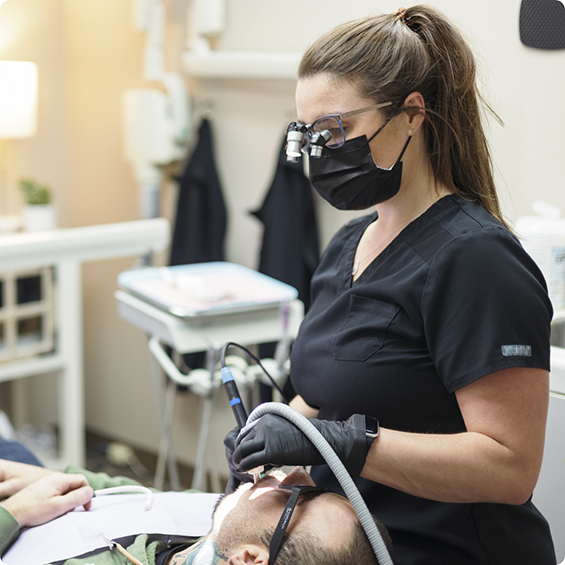
Dental implants in Lakewood allow you to enjoy the next best thing to your natural teeth. As the most preferred solution to treat tooth loss, they have the potential to last a lifetime; however, their treatment process is far different from conventional options. Although it may seem like an overwhelming process, you have nothing to fear. Each step of your treatment is vital to ensuring the long-term success of your new smile. By understanding how the process works, you can head into your treatment with confidence.
Initial Dental Implant Consultation
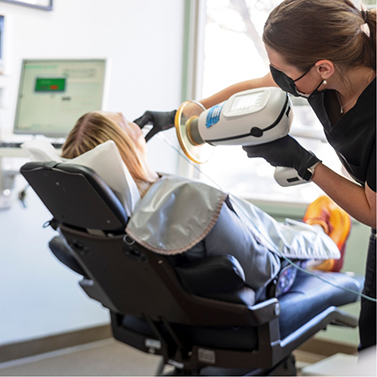
In most cases, if you have missing teeth and good oral health, you are a candidate for dental implants, but you must undergo a consultation process. Our dentist performs a visual examination and take diagnostic images, including a CT scan. This allows us to assess your oral structures to ensure you are a candidate for the treatment. Your medical and lifestyle history are also discussed to look for any factors that may influence the long-term success of your smile.
Dental Implant Surgery
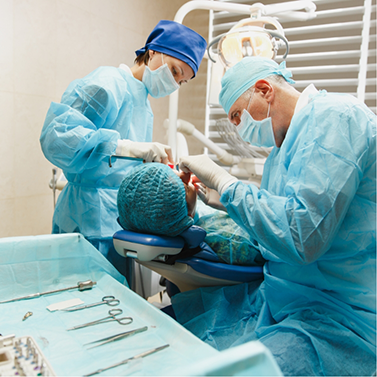
Most other dental offices will refer you for dental implant surgery, but at Lakewood Complete Dentistry, we can do everything under one roof. We have the training, tools, and technology to perform every step of your dental implant treatment. In the end, this will save you time and money and give you the peace of mind of working with the same implant dentist and team from start to finish.
The images taken during your consultation are used to pinpoint the exact location for the placement of your posts. To insert them into your jawbone, you must undergo a surgical procedure. Sedation or anesthesia is used to ensure your comfort as your oral surgeon opens your gum tissue to expose your jawbone. A small hole is drilled into it for each implant post to be placed. Your gum tissue is sutured closed, and the healing process begins.
Dental Implant Osseointegration/ Abutment
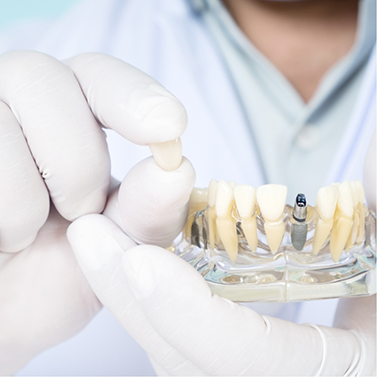
The implant posts act as new tooth roots, which stimulate your jaw to encourage bone growth. Over the next several weeks, your jawbone fuses to the posts through a process called osseointegration. The new growth preserves your bone density while also allowing your dental implants to potentially remain in place forever with the right aftercare. After you have healed, your restorations will have the stable foundation they need to function like natural teeth. Before we can place your restorations, abutments are connected to the posts.
A minor surgical procedure is needed to attach the abutments, which are connector pieces between the implants and the restorations. Your gum tissue is opened to expose the heads of the post, allowing us to attach the abutments successfully. Your gum tissue heals around them to seal out bacteria while creating a natural-looking appearance.
Delivery of Dental Implant Restorations
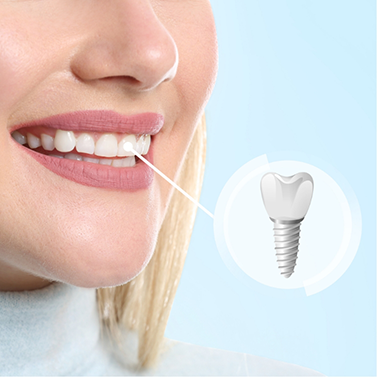
About 2 weeks after your abutments are placed, it is time for the final phase of your treatment. A digital impression of your mouth is used to carefully craft your restorations. They are made from all-ceramic material to give you a durable solution that looks natural. Your prosthetics are designed to match the color, size, and shape of your real teeth, so no one will be able to tell they are not your own.
Benefits of Dental Implants

Of course, placing dental implants isn’t the only way to replace teeth. Dentures and dental bridges have been around for a very long time and remain popular options for helping people recapture their smile. However, if you choose dental implants, your new teeth will come with a lot of advantages that you can only enjoy by replacing the roots as well as the crowns. After we’ve evaluated your mouth during your first consultation, we can go over the benefits of implants and how they can make your life healthier and happier.
Day-to-Day Benefits

Dental implants grant a lot of freedoms that you’ll be able to take advantage of every day. Thanks to their unique properties, you can enjoy:
- A Smile That Looks and Feels Natural: After integrating with the jawbone, dental implants feel so natural that some patients have said they occasionally forget they even have them. Even better, most people won’t be able to tell the difference between your real teeth and your implant restoration(s), so you won’t have any reason to doubt your appearance.
- Simple Maintenance: Maintaining traditional dentures often involves specialized products, such as adhesives and cleansing solutions. Dental implants, on the other hand, can be cared for in much of the same way as your natural teeth, making it easy to keep them healthy for life.
- Unrestricted Diet: Dental implants are almost as strong as natural teeth, and because of that, they allow you to comfortably eat all kinds of foods, including steak and other tough meats.
Health Benefits

Of course, replacing teeth isn’t just about improving your appearance; there are health issues to consider. Implants benefit your mouth and the rest of your body thanks to these benefits:
- Bone Loss Prevention: The jawbone requires stimulation, which normally comes from your teeth. Said stimulation encourages the body to maintain a healthy level of bone density. Dental implants are the only form of tooth replacement that can provide such stimulation and work to prevent tooth loss.
- Improved Oral Health: In addition to keeping the jawbone strong, dental implants prevent your remaining natural teeth from moving into the gaps left by your lost teeth, and they’re generally easier to clean.
- Healthier Lifestyle: Being able to eat whatever you want doesn’t just make your meals more enjoyable; it also improves your ability to maintain a nutritious diet.
Long-Term Benefits

Implants provide plenty of advantages in the present, but their full value lies in the future. Over the long term, you can enjoy these benefits thanks to implants:
- High Rate of Success: After 10 or even 20 years, the success rate of dental implants is still as high as 95 percent.
- Youthful Appearance: By preventing bone loss and maintaining a healthy jaw, dental implants can keep you looking young as the years go by.
- Longevity: Dental implants can last for several decades without needing to be replaced, with many patients even being able to keep them for the rest of their lives.
Who Dental Implants Can Help

Dental implants are quickly becoming one of the most popular tooth replacement options available, and it’s easy to see why! Almost anyone dealing with tooth loss can enjoy the benefits of rebuilding their smile with this state-of-the-art treatment. Read on to learn more about who makes a good candidate for dental implants and how they address all degrees of tooth loss.
Who Is a Good Candidate for Dental Implants?

One of the key aspects of being able to receive dental implants is having a strong jawbone, as it serves as the foundation for your implant and restoration. It’s also important that your oral health is in good shape, too, especially since gum disease and tooth decay can negatively impact your dental implant.
When discussing with one of our dentists during your initial consultation, you can expect us to examine and use the following information to determine if you’re a qualified candidate:
- State of your oral health (i.e., do you have gum disease or tooth decay)
- Jawbone density
- Any lifestyle habits that could hurt the success of your implant placement (i.e., smoking)
- Your overall health (i.e., diabetes, an autoimmune disorder) and if it could be problematic for dental implants
Should we discover problems during your consultation, we will suggest methods of treatment before having implants placed. If necessary, you might need a bone graft or sinus lift to create extra bone support, which we offer as well.
Dental implants are actually quite versatile, capable of replacing single, multiple, and even an entire set of teeth using a variety of custom-made restorations.
Missing 1 Tooth
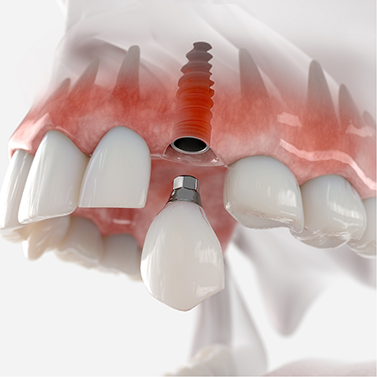
A crown can be directly attached to an implant root using a small connector called an abutment. The crown will be color-matched to your smile, able to stand firm on its own, and function just like the teeth that surround it. In the end, only you and your dentist will know that it is not real!
Missing Multiple Teeth
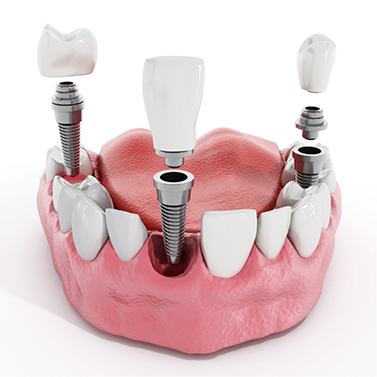
Dental implants can also be used to support a bridge to fill in the gap left by consecutive missing teeth. Two crowns are placed on either side of the missing ones, and these are bonded to additional prosthetic teeth that close the space.
Missing All Teeth
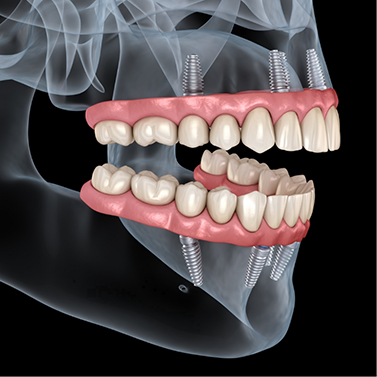
Whether you need a new denture or want to upgrade your current one that doesn’t fit very well, dental implants can help you do it. Implant dentures are secured directly to the jawbone, so they are much less likely to move unexpectedly in the mouth compared to removable dentures. Plus, with the patented All-On-4 procedure, we can even replace an entire row of teeth in just one well-planned appointment.
Learn More About All-On-4 Implants
Understanding the Cost of Dental Implants

Unlike traditional dental bridges and dentures alone, dental implants go beyond the gum surface to completely replace the entire tooth structure. As a result, getting dental implants typically includes a higher upfront cost; however, when you consider everything that comes with dental implants, you’ll quickly see why it’s the solution we recommend most often for tooth replacement.
Preliminary Treatments & Dental Implant Surgery
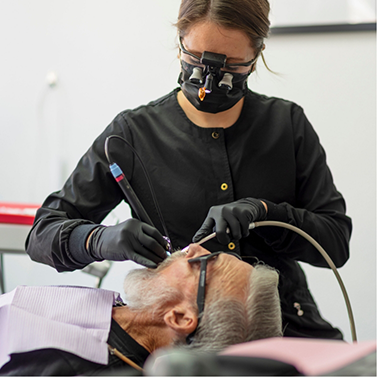
To receive dental implants, it’s not uncommon to need preliminary treatments completed ahead of time. For example:
- Tooth extractions and gum disease therapy may be needed if unviable teeth are present or if you have untreated gum disease. Extractions are common when a tooth is already failing or when room needs to be made for an implant denture.
- Not only is oral surgery needed to place implants, but it comes with its own separate fees. Our office keeps the entire process in-house, so individual services outside of surgery (such as anesthesia) will be more convenient when you visit us for treatment.
The Parts of Your Dental Implant
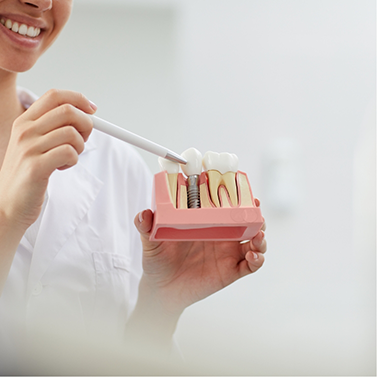
The cost of your dental implant treatment will vary from the next patient’s because your smile will have unique needs. Believe it or not, there are several kinds of dental implants that can affect your total. The number of teeth you need to have replaced, and the materials used can also affect the price you’ll pay. While many dental implants are made from titanium, they can also be made from zirconia.
Dr. Artino has the advanced training and knowledge to know exactly how to set you up for success with your fully restored smile and are happy to break down the implants and materials we use to do so.
Final Dental Implant Restoration
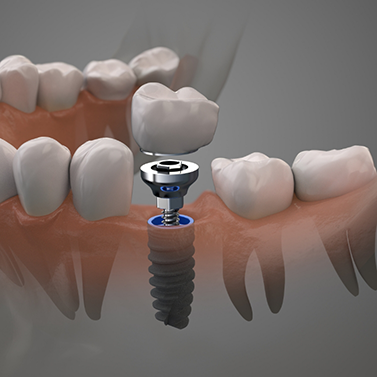
The final restoration for your implants will change depending on how many teeth you need to replace as well as where they are located. For example, individual teeth are covered with implant crowns, while a pair of implants are covered with a dedicated bridge. If a series of implants are placed throughout the mouth, we would use a dedicated partial or full denture designed to attach to these posts. All restorations are custom-shaded to blend in with existing teeth and your other oral structures for the most natural esthetics possible.
Does My Dental Insurance Cover Dental Implants?

In most cases, dental insurance does not generally provide coverage for dental implants. With that said, there are some exceptions when it comes to the preliminary treatments needed to place implants or the restoration that sits on top of the post. We’ll gladly look over your dental insurance benefits and confirm that you are maximizing them to the fullest. If you do receive coverage, keep in mind that it will likely be only at a percentage, meaning you’ll need to cover any remaining balance.
Making Dental Implants Affordable

Those who don’t have dental insurance can still make treatment affordable. Third-party financing options like CareCredit offer patients monthly payment plans to cover more expensive treatments like dental implants. Depending on the length of your plan, you can even pay little to zero interest on these installments! Additionally, patients can enroll in our Dental Savings Plan, an in-house option that helps you save on other treatments. This can make it easier to put money toward dental implants or other tooth replacements.
Advanced Dental Implant Procedures

At Lakewood Complete Dentistry, we want all our patients to have access to the best treatment options available. No solution is better than dental implants when it comes to comprehensive tooth replacement; however, some patients have preexisting dental issues that make it difficult to receive treatment. We provide advanced dental implant procedures like bone grafting and sinus lifts to help more patients enjoy lifelike tooth replacements. Read on to learn more!
Bone Grafting
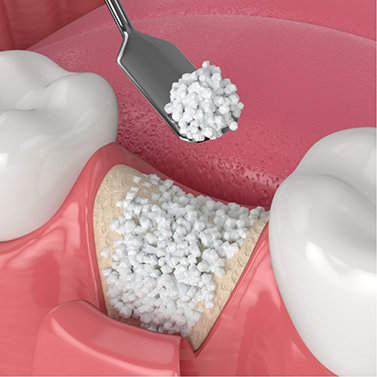
Dental implants in Lakewood have a success rate of over 90%, and a significant reason for their predictability is a process called osseointegration. When a dental implant is placed in the jawbone, it acts as an artificial tooth root. This stimulates the jawbone, allowing it to grow and fuse to the implant. The result is a strong and stable implant ready for the restoration.
However, if you’ve lost density in your jaw, you may not have enough bone for implants to be placed. Thankfully, our bone grafting in Lakewood enhances the strength and thickness of your jaw. A small piece of bone is taken from another area of your body or a donor and transferred to the area of treatment. From there, your gum tissue is stitched closed, allowing the newly grafted bone to integrate with your jaw. This will take several months to heal but will create the strong base you need for dental implants.
Sinus Lifts
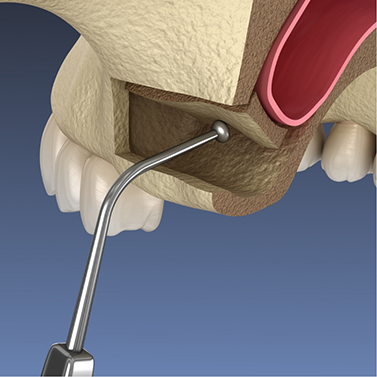
If you have bone loss in the upper arch of the smile, there may not be enough bone near your sinuses to place dental implants. A sinus lift in Lakewood, which is also known as a sinus augmentation, adds bone to the upper arch near the back of the mouth. We can slightly open your gum tissue to lift your sinus gently and graft new bone. Lastly, we’ll close your gum tissue so that the healing process can begin.
Maintaining & Caring for Your Dental Implants

Understanding proper dental implant care in Lakewood can make a difference in whether your new smile remains firmly in place for a lifetime or requires additional treatment in a matter of years. Knowing what to do and how to adequately maintain your new prosthetics will allow you to enjoy their benefits, many of which cannot be achieved with other tooth replacement solutions. Our team at Lakewood Complete Dentistry is here to provide the following tips to help you maintain a longer-lasting smile. If you have questions or need additional information, don’t hesitate to contact our office.
Making Oral Hygiene a Priority

By brushing, flossing, and rinsing regularly, you can lower your risk of tooth decay, gum disease, and other common oral health problems. When you neglect your oral hygiene, you run the risk of developing an infection that can negatively impact your natural teeth as well as your implants. Bone loss, which is commonly associated with gum disease, can lead to implant failure; however, by choosing to remain diligent with your dental regime each day, you can enjoy the benefits of a longer-lasting, more beautiful smile.
Eating a Healthy Diet

No one is saying you can’t enjoy a cookie or a slice of pie now and then, but these items shouldn’t be part of your daily diet. Healthier alternatives like fruits and vegetables, leafy greens, lean proteins, and low-fat dairy are great options that can benefit not only your waistline but also your gum health and tooth enamel. By eating healthier foods, you give your body the nutrients it needs to function properly as well as a smile that looks and feels superb for years to come.
Breaking Bad Habits

One of the quickest ways to damage your dental implants in Lakewood is to continue practicing bad habits. Smoking, using tobacco products, nail-biting, chewing on pens and pencils, eating ice, and using your teeth to open packages can damage your implants and result in more serious injuries if you’re not careful. Finding cessation groups or resources to help you quit or keeping sugar-free chewing gum in your pocket are great ways to curb the temptation of these bad habits and better protect your smile.
Protecting Your Dental Implants
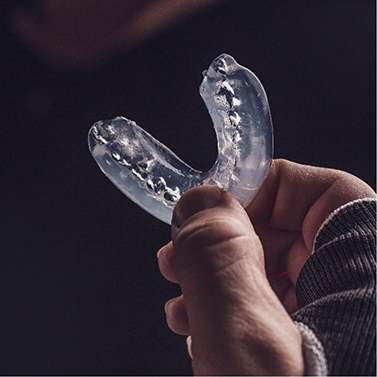
Your implant dentist in Lakewood is a great ally if you need a customized mouthguard. Whether you enjoy playing sports or suffer from bruxism (teeth grinding) at night, we can create a custom-made oral appliance that you can wear while on the field or in bed that will protect your teeth from injury. A sudden fall or continuous grinding of your upper and lower teeth can wear away natural tooth enamel and cause breaks or chips in your implant restoration. By wearing a protective mouthguard over your upper teeth, you will be doing your mouth a favor and keeping your natural teeth and dental implants safe from potential damage.
Scheduling Regular Dental Checkups
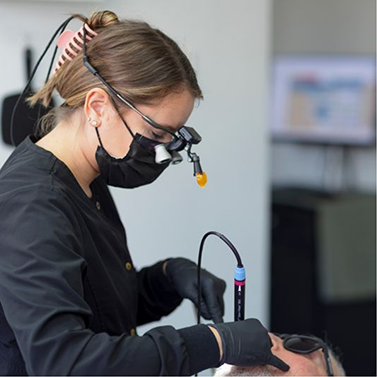
No matter how many teeth you have replaced with dental implants, it’s important that you keep your regular dental checkups and cleanings. These visits allow your dentist to carefully review your soft oral tissues, natural teeth, and customized restorations and prosthetics. Regular appointments can be extremely effective at ensuring the longevity of your new smile and give us the chance to make any adjustments or recommendations should minor or major problems arise.
Dental Implant FAQs
Will Getting Dental Implants Hurt?
Many patients find that dental implant surgery is much less uncomfortable than they initially thought. The mouth will be numbed with a local anesthetic, and our dentists’ placement techniques are very gentle, so little to no discomfort is usually experienced during the surgery. Once the anesthetic wears off, you’ll feel some soreness for a few days, but you can expect it to be mild. Pain medication will be prescribed, but you may or may not need it. Severe discomfort that does not get better over time is not normal; contact us right away if you become concerned about the level of pain you’re experiencing.
What Can I Eat After Getting Implants?
Once your implants have integrated with the jaw and are topped with a restoration, you can eat anything you want. Of course, the days immediately following the surgery are a different story. For the first couple of days, your diet should consist of milkshakes, yogurt, smooth soups, cottage cheese, mashed potatoes, and various other liquids or soft foods. From the third day onwards, you can move up to soft sandwiches, cooked noodles, and other meals that don’t require much chewing. Normally, around the seventh day after surgery, your mouth should have healed enough for you to return to a regular diet.
How Long Will It Take for Dental Implants to Heal?
It depends on the situation. Everyone heals at different rates, and the state of your overall health can affect your body’s ability to recover from surgery. Also, it takes more time for the mouth to heal if multiple implants are placed as opposed to just a single post. Under normal circumstances, you can expect the healing process to be roughly anywhere from 6 to 12 weeks. Remember not to use straws or smoke in the days following surgery, as these actions could end up extending the healing process.
Will Insurance Help Pay for Dental Implants?
We highly recommend getting in touch with your insurance provider to clarify your coverage; our team can also go over anything that’s confusing you if you reach out with your policy information. Even if the implants themselves aren’t covered (which is often due to insurance companies considering them to be an elective procedure), part of the restoration or restorations they support might be eligible for benefits. Many plans will also help pay for procedures that are commonly performed to prepare for implant surgery, such as periodontal therapy.
